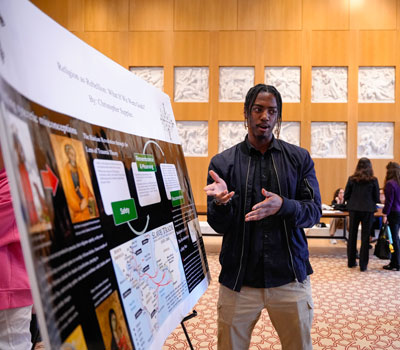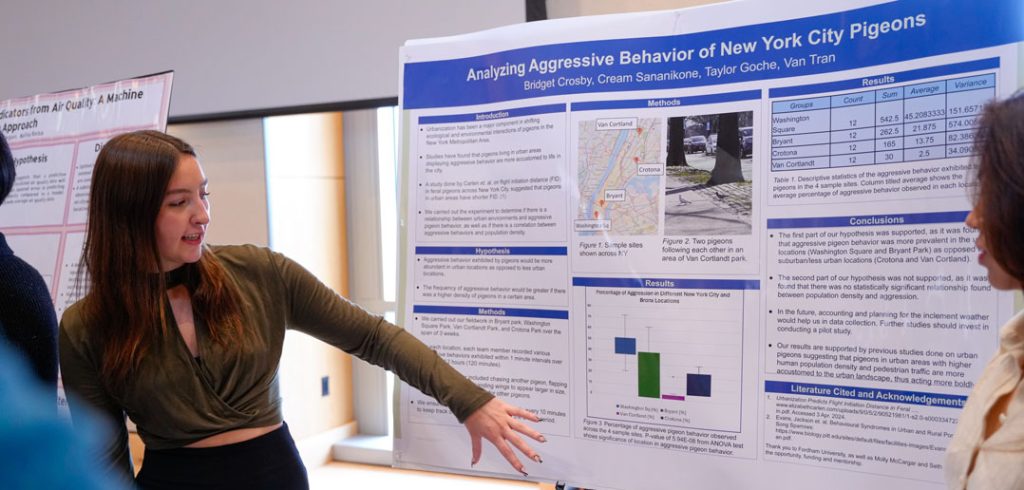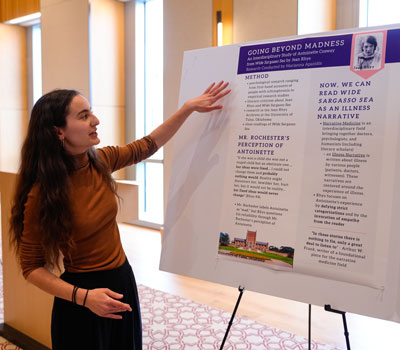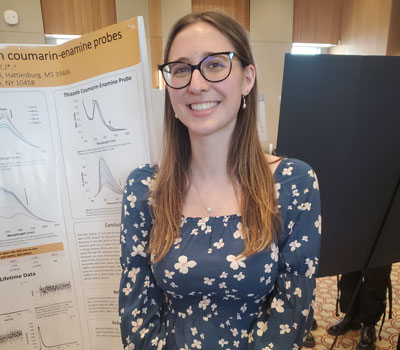From aggressive pigeons to the role of Haitian Vodou in confronting the shared trauma of slavery, hundreds of student researchers examined topics that ‘fascinated’ them, displaying their work at the annual Fordham College at Rose Hill Undergraduate Research Symposium on April 17.
Aggressive Pigeon Behavior: Bridget Crosby, Taylor Goche, Cream Sananikone, and Van Tran
Going to school in New York City made these four biological science majors “fascinated by pigeons.” “I’ve noticed particularly how close pigeons get to us, how they’re foraging for food, how they’re really never alone,” Crosby said. “I’m just fascinated by pigeons, especially in Manhattan, in comparison to more suburban areas. We wanted to see whether there was a correlation between the aggressive behavior and the location that they live in.” Working with the Ecology Lab at Fordham, the team spent hours in four parks analyzing pigeon behaviors. They found pigeons were more aggressive in the urban parks—Bryant Park and Washington Square Park, compared to the more suburban parks—Van Cortlandt Park and Crotona Park, concluding that pigeons in more urban areas are more accustomed to traffic and people, prompting them to act more boldly.
Mental Health in Literature: Marianna Apazidis
A senior from Massachusetts who is double-majoring in psychology and English, Apazidis united her academic interests through research that examined the portrayal of mental health in literature, particularly in Wide Sargasso Sea by Jean Rhys. The novel centers on a protagonist often considered to be schizophrenic in literary interpretations. Apazidis received a summer research grant that allowed her to visit the Jean Rhys archives in Tulsa, Oklahoma. There, she conducted empirical research, first-hand interviews, and archival research to investigate why the novel’s protagonist is often diagnosed this way and whether this is an accurate portrayal of psychosis. “I started with psychology because I’ve always been interested in how people work and what makes them who they are,” she said. “I quickly found that English is a very similar parallel discipline. I think literature is one of the most important ways to study human nature.”
Detecting the Presence of Metals in Water: Eva Riveros
Riveros was drawn to chemistry as a tangible way to find environmental solutions. Her research project involved the development of a Thiazole probe—a solution that uses proton transfer and fluorescence to detect the presence of metals in water samples. Riveros hopes to eventually create strips using the solution that can be used more easily and efficiently. “One of the main applications we’re thinking of is drinking water, so safety,” said the junior from New Jersey. Riveros developed her love of research after completing the ASPIRES program, which gives incoming students practical exposure to labs and hands-on experimentation.
Religion as Rebellion: Christopher Supplee

Supplee’s interest in how shared narratives shape cultural experiences led him to research the role of Haitian Vodou in confronting the shared traumatic experience of slavery. Supplee applied the three-part trauma recovery theory from Dr. Judith Herman, a leading expert on trauma, as a basis to examine the migration of Vodou from Haiti to the United States. “I look at how the enslaved population used [the practice of]voodoo as a means of maintaining their humanity under the dehumanizing conditions of slavery and rebuilding the community bonds that were separated through the TransAtlantic slave process,” said Supplee, an English and theology major from Philadelphia, “but also making new ones as a result of the diverse peoples that were coming from or transported from the African continent,” he said.
Additional reporting by Kelly Prinz.



